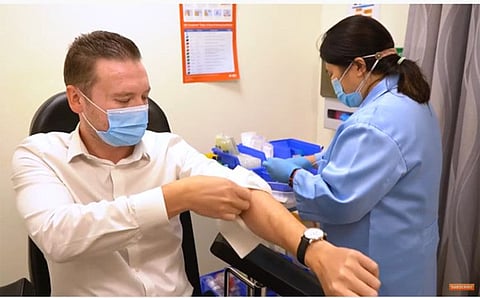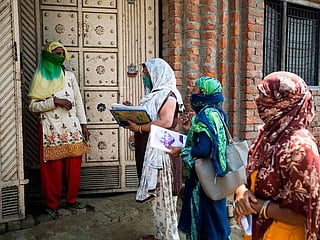Watch: COVID-19 antibody test in UAE - everything you need to know
Now available in most hospitals, test can determine UAE’s herd immunity rate

Also In This Package
Dubai: Several hospitals in Dubai are offering the COVID-19 antibody test, which can help screen who has been exposed to the virus, while assessing the level of herd immunity the community has achieved.
Dr Mahir Al-Hilali, Senior Corporate Director of Laboratory Services, at Mediclinic Middle East, said, “The COVID-19 antibody test is able to detect the body’s immune response to the SARS-Cov 2 virus. Every human being who comes in touch with any kind of virus triggers an immune response from the body and produce antibodies as a protection from the virus.
“In the active phase of the disease the body produces IgM antibodies and later produces IgG antibodies. Preliminary research studies have shown that patients who have recovered from COVID-19 have variable levels of antibodies suggesting that the presence of antibodies can give a short term immunity to infection with SARS-CoV-2 and may reduce the probability of infection in an individual. “However definitive data is still lacking. It can especially help in the surveillance of medical workers and frontline staff battling the pandemic who have been exposed to the virus and enable us to know which of them are less likely to fall sick with COVID-19.”
Dr Al Hilali did caution however that the test should not be used as a sole means to diagnose COVID-19.
The antibody test has less value in cancer patients and those undergoing chemotherapy or patients suffering from any other disease that compromises their immune system that will impair the production of antibodies.
No substitute
The regular nasal swab for the Reverse Transcriptase Polymerase Chain Reaction Test (RT-PCR) is the gold standard for determining if a patient is COVID positive and this test is not interchangeable with the antibody test.
Dr Al Hilali, added, “The COVID-19 RT-PCR is a real-time test for the qualitative detection of nucleic acid from SARS-CoV-2 virus in upper and lower respiratory specimens.
“The RT-PCR test detects the presence of the virus hours after the body has been exposed to it. This virus remains active from day zero up to 14 days. The antibodies commonly become detectable 1-3 weeks after symptoms onset, when the immune system is triggered to produce the antibodies against the COVID 19 Virus. The RT-PCR test is mandatory to ascertain if a person who displays classic COVID 19 symptoms of cough, sore throat, fever, fatigue and breathless is confirmed positive. Or else we will miss the infective stage. The antibody test can support the diagnosis of COVID-19 illness in late disease presentation with negative PCR. Up to 50 per cent of people who come into contact with the virus are asymptomatic and a positive antibody test can help us ascertain that.”
Patients who have recovered from COVID-19 and have IgG antibodies that this test can confirm can also donate their plasma for Convalescent Plasma Therapy (CPT) so this test is crucial in helping hospitals collect data on recovered patients.The test priced at Dh266 provides results within a few hours and hospitals are equipped with doing 200 tests in one go.
Herd Immunity
When a large number of people in a community are exposed to a virus and recovered, they develop immunity to the virus although in case of COVID 19 there is no definitive research as to how long these people remain immune. But experts say if COVID-19 results in infection of a large population that has recovered unknowingly, it would mean that the global population was closer to achieving “herd immunity”.
The antibody tests are good screening tests post recovery to know what percentage of the population was exposed to the virus. Globally, we will develop herd immunity when the coronavirus has spread through enough of the population, but there is no accepted timeline for how long that will take.









